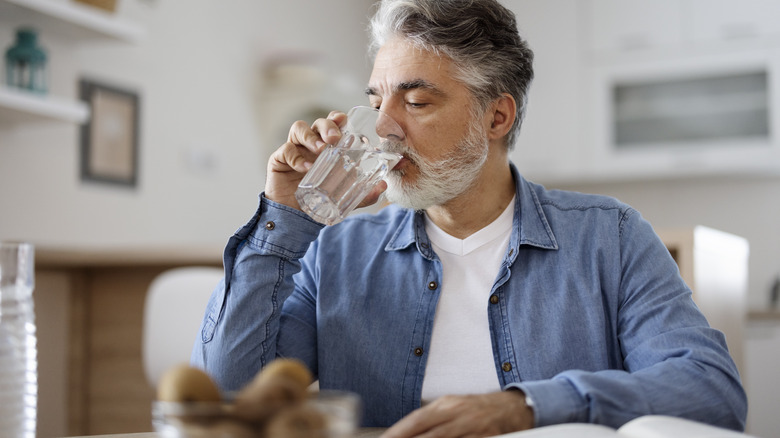The Hidden Dangers Of Taking Your Medication With This Popular Beverage
Medication is just part of daily life for some, especially as you age. Each medication has different requirements for taking it. For example, taking the correct dosage is crucial to ensuring an accidental overdose doesn't happen. You also check your medication to be sure it hasn't expired. Many people also look at the side effects and possible interactions of medications to ensure that they won't find themselves in a life-threatening situation.
But did you know some things could affect your medication, like what you take it with? Many pills you take are bitter, so some try to cover up the bitter taste with a sugary drink. However, pills don't work correctly with specific drinks. That's why taking your medication with just water is recommended. For example, the U.S. Food & Drug Administration notes that grapefruit juice can affect the function of an intestinal enzyme vital for helping medications metabolize, allowing too much of the drug to accumulate in the body. This is why grapefruit juice warnings can be found on certain medications.
Another drink you shouldn't take medications with: soft drinks. There's evidence that taking medication with carbonated soda can affect its breakdown within your digestive tract. Simply put, covering up the bitterness of medication with sugary drinks just isn't worth it.
Soft drinks affect how medication is metabolized
All drinks are not equal when it comes to taking your medications. A study in the Saudi Pharmaceutical Journal found that consuming common over-the-counter medications with Coca-Cola increased the medications' disintegration time. The study had patients take five immediate-release drugs with several drinks, including cola. The cola increases the disintegration of four out of five of them. The researchers concluded that patients shouldn't take medications with anything but water.
Additionally, a study of cola-containing drinks published in Clinical Nutrition demonstrated how cola can interact with drug absorption, metabolism, and excretion. For example, the serum concentrations of several medications, including ibuprofen, increased with cola consumption. The study also noted that the increase created by these drinks could produce a toxic combination. Therefore, the researchers recommended letting your doctor know when you drink soda along with your medications any time you have an adverse reaction.
Allergic reactions are part of the toxic effect. According to Better Health Channel, allergic reactions to medications are more common with antibiotics and non-steroidal anti-inflammatory drugs (NSAIDs). Symptoms of an allergic reaction include swelling of the lips and face, hives, tingling in the mouth, and abdominal pain.
Why you should take medication with only water
Understanding how the body absorbs medication can help you understand why only taking medications with water is essential. According to the National Institute of General Medical Science, medication follows a specific path from the pill you put in your mouth to helping your cold or pain called ADME (Absorption, Distribution, Metabolism, Excretion).
The first stage of the path is absorption. The substance you take the pill with helps flush it into your stomach, where it's broken down by stomach acid to be taken to the intestines and absorbed into the blood. According to the Southeastern Medical Oncology Center, some pills can get hung up in this area, leading to stomach ulcers. It is distributed in the circulatory system to the specific organ it's designed to target. After it's done its job, it's metabolized or broken down to be excreted through your waste. For example, metformin is distributed by the blood to help decrease how much glucose you're taking in to keep your blood sugar stable in those with diabetes. It breaks down after several hours and is excreted, meaning some people take it multiple times a day.
To complete the ADME process according to the drug specifications, you must take it with water. This is because water is used in nearly every stage of the drug testing process, from dosage to testing environment (per Today's Clinical Lab). Even different water contaminants can influence a drug's resolution and peaks. Therefore, taking your medication with anything but water can affect the medication's specialized process.



